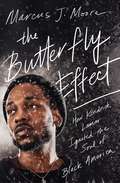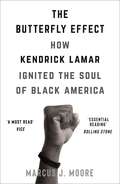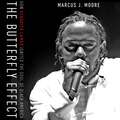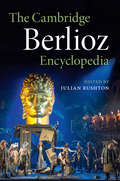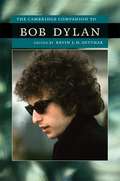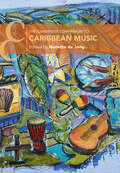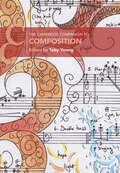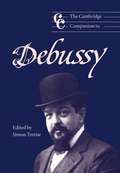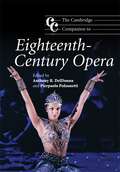- Table View
- List View
The Butterfly Effect: How Kendrick Lamar Ignited the Soul of Black America
by Marcus J. MooreThis &“smart, confident, and necessary&” (Shea Serrano, New York Times bestselling author) first cultural biography of rap superstar and &“master of storytelling&” (The New Yorker) Kendrick Lamar explores his meteoric rise to fame and his profound impact on a racially fraught America—perfect for fans of Zack O&’Malley Greenburg&’s Empire State of Mind.Kendrick Lamar is at the top of his game. The thirteen-time Grammy Award-winning rapper is just in his early thirties, but he&’s already won the Pulitzer Prize for Music, produced and curated the soundtrack of the megahit film Black Panther, and has been named one of Time&’s 100 Influential People. But what&’s even more striking about the Compton-born lyricist and performer is how he&’s established himself as a formidable adversary of oppression and force for change. Through his confessional poetics, his politically charged anthems, and his radical performances, Lamar has become a beacon of light for countless people. Written by veteran journalist and music critic Marcus J. Moore, this is much more than the first biography of Kendrick Lamar. &“It&’s an analytical deep dive into the life of that good kid whose m.A.A.d city raised him, and how it sparked a fire within Kendrick Lamar to change history&” (Kathy Iandoli, author of Baby Girl) for the better.
The Butterfly Effect: How Kendrick Lamar Ignited the Soul of Black America
by Marcus Moore__________'Essential reading' Rolling Stone'A must read. The best bit of literature currently out there on Kendrick Lamar' VICE __________Kendrick Lamar is at the top of his game.He has been described as perceptive, philosophical, unapologetic, fearless, and an innovative storyteller whose body of work has been compared to James Joyce and James Baldwin.He is a visionary who will go down as history as one of the most important artists of all time.But what's so striking about Kendrick Lamar, aside from his impressive accolades, is how he's effectively established himself as a formidable opponent of oppression, a force for change. Through his confessional poetics, his politically charged anthems, and his radical performances, Lamar has become a beacon of light for many people in America.The Butterfly Effect not only Lamar's powerful impact on music but also on our current society, especially under the weight of police brutality, divisive politics, and social injustice. This is the extraordinary, triumphant story of a modern lyrical prophet and an American icon who has given hope to those buckling under the weight of systemic oppression, reminding everyone that through it all, "we gon' be alright".__________'By the end of listening to his first full album, I felt like I knew everything about him. He brings you into his world with his lyrics in a way that really paints a clear picture' Eminem'I love everything about his music. I can literally listen to his music and become a kid growing up with all the struggles in the inner city, but at the same time [learn] all the lessons it taught that we use as men today.' Lebron James'Kendrick Lamar understands and employs blues, jazz, and soul in his music, which makes it startling. His work is more than merely brilliant; it is magic' Toni Morrison'Lamar is a man living on a real and metaphorical peak, with one eye trained on the heavens, the other searching for stories in the valley below' Guardian
The Butterfly Effect: How Kendrick Lamar Ignited the Soul of Black America
by Marcus Moore'Kendrick Lamar understands and employs blues, jazz, and soul in his music, which makes it startling. His work is more than merely brilliant; it is magic' Toni Morrison'Lamar is a man living on a real and metaphorical peak, with one eye trained on the heavens, the other searching for stories in the valley below' Guardian __________Kendrick Lamar has been described as the poet Laurette of hip-hop, perceptive, philosophical, unapologetic, fearless, and an innovative storyteller whose body of work has been compared to James Joyce and James Baldwin. He is a visionary who will go down as history as one of the most important artists of all time. But what's so striking about Kendrick Lamar, aside from his impressive accolades, is how he's effectively established himself as a formidable opponent of oppression, a force for change. Through his confessional poetics, his politically charged anthems, and his radical performances, Lamar has become a beacon of light for many people in America. Now, for the first time, we will be taken on a journey of Lamar's life. Told through his three albums, The Butterfly Effect gives unparalleled insight into his background, influences and the importance of his music. The book traces not only Lamar's powerful impact on music but also on our current society, especially under the weight of police brutality, divisive politics, and social injustice. With exclusive interviews with his family, friends, and record producers, this book is the must-read for any fan.
The Cake and The Rain: A Memoir
by Jimmy WebbJIMMY WEBB'S words have been sung to his music by a rich and deep roster of pop artists, including Glen Campbell, Art Garfunkel, Frank Sinatra, Donna Summer, and Linda Ronstadt. He's the only artist ever to win Grammy Awards for music, lyrics, and orchestration, and his chart-topping career has, so far, lasted fifty years, most recently including a Kanye West rap hit and a new classical nocturne. Now, in his first memoir, Webb delivers a snapshot of his life from 1955 to 1970, from simple and sere Oklahoma to fast and fantastical Los Angeles, from the crucible of his family to the top of his longed-for profession. Webb was a preacher's son whose father climbed off a tractor to receive his epiphany, and Jimmy, barely out of his teenage years, sank down into the driver's seat of a Cobra to speed to Las Vegas to meet with Elvis. Classics such as "Up, Up and Away," "By the Time I Get to Phoenix," "Wichita Lineman," "Galveston," "The Worst That Could Happen," "All I Know," and "MacArthur Park" were all recorded by some of the most important voices in pop before Webb's twenty-fifth birthday--and he thought it was easy. The sixties were a supernova, and Webb was at the center, whipsawed from the proverbial humble beginnings into a moneyed and manic international world of beautiful women, drugs, cars, and planes. That stew almost took him down, but Webb survived, his passion for music and work among his lifelines. The Cake and the Rain is a surprising and unusual book; Webb's talent as a writer and storyteller is on every page. His book is rich with a sense of time and place, and with the voices of characters, vanished and living, famous and not, but all intimately involved with him in his youth, when life seemed nothing more than a party and Webb the eternal guest of honor. "America's songwriter," is the author of the musician's bible Tunesmith: Inside the Art of Songwriting (on Bookshare and on BARD). Webb's songs, with their complex chord structure, have been recorded or performed by artists from Frank Sinatra to Carly Simon to REM. He tours extensively, performing his own works and stories in the United States and around the world. He was the youngest man ever inducted into the Songwriters' Hall of Fame and was named by Rolling Stone magazine as one of the top fifty songwriters of all time. A father of six and grandfather of one, Webb lives with his wife, Laura Savini, in New York.
The Cambridge Berlioz Encyclopedia
by Julian RushtonWith over forty international specialist authors, this Encyclopedia covers all aspects of the life and work of Hector Berlioz. One of the most original composers of the nineteenth century, he was also internationally known as a pioneer of modern conducting, and as an entertaining author of memoirs, fiction, and criticism. His musical reputation has fluctuated, partly because his works rarely fit into conventional categories. As this Encyclopedia demonstrates, however, his influence on other composers, through his music and his orchestration treatise, was considerable, and extended into the twentieth century. The volume also covers Berlioz's connections with government officials and Paris concert societies and theatres, and contains information on his wide social circle including important literary figures. The Encyclopedia explores his fascination with foreign authors such as Shakespeare, Moore, and Goethe, and treats fully his promotion of his own and others' music, often at his own financial risk.
The Cambridge Companion To Brass Instruments
by Trevor Herbert John WallaceThe Cambridge Companion to Brass Instruments provides an overview of the history of brass instruments, and their technical and musical development. Much of the volume is devoted to the way brass instruments have been used in classical music, but there are also important contributions on the ancient world, non-Western music, vernacular and popular traditions and the rise of jazz. The editors are two of the most respected names in the world of brass performance and scholarship, and the list of contributors includes the names of many of the world's most prestigious scholars and performers.
The Cambridge Companion To Schubert
by Christopher H. GibbsThis volume explores the culture in which the composer Franz Schubert (1797SH1828) lived and worked, and provides a basic outline of his life examined in relation to the most persistent myths and legends. Schubert's music is then explored according to genre, a chapter on his songs, another on his symphonies, and so forth. The final section looks at the reception of Schubert's music, primarily during the nineteenth century, and considers the performance tradition of his music.
The Cambridge Companion to Bach
by John ButtThe Cambridge Companion to Bach, first published in 1997, goes beyond a basic life-and-works study to provide a late twentieth-century perspective on J. S. Bach the man and composer. The book is divided into three parts. Part One is concerned with the historical context, the society, beliefs and the world-view of Bach's age. The second part discusses the music and Bach's compositional style, while Part Three considers Bach's influence and the performance and reception of his music through the succeeding generations. This Companion benefits from the insights and research of some of the most distinguished Bach scholars, and from it the reader will gain a notion of the diversity of current thought on this great composer.
The Cambridge Companion to Beethoven
by Glenn StanleyThis Companion provides a comprehensive view of Beethoven and his work. The first part of the book presents the composer as a private individual, as a professional, and at the work-place, discussing biographical problems, Beethoven's professional activities when not composing and his methods as a composer. In the heart of the book, individual chapters are devoted to all the major genres cultivated by Beethoven and to the elements of style and structure that cross all genres. The book concludes by looking at the ways that Beethoven and his music have been interpreted by performers, writers on music, and in the arts, literature, and philosophy. The essays in this volume, written by leading Beethoven specialists, maintain traditional emphases on Beethoven studies while incorporating some of the most recent developments in musicology and theory.
The Cambridge Companion to Benjamin Britten, Billy Budd
by Mervyn CookeBilly Budd, based on Herman Melville's nautical allegory, is one of Britten's most challenging operas. This comprehensive guide considers the work from both literary and musical viewpoints. Melville's novella is discussed, as is the interpretation given to the novella by the librettists E. M. Forster and Eric Crozier. A detailed synopsis guides the reader through the musical and dramatic action of the opera and in a chapter devoted to the music, Britten's distinctive technique of tonal symbolism is analyzed to demonstrate the effectiveness of his musical response to the dramatic suggestions of Melville's story. The most important critical writings on Billy Budd are represented by an expanded version of Donald Mitchell's 1979 notebook on the opera. A final chapter charts the opera's stage history and fluctuating critical reception.
The Cambridge Companion to Berlioz
by Peter BloomStill chiefly known as the extravagant composer of the Symphonie fantastique, Berlioz was an artist caught in the crossfire between the academic classicism of the French musical establishment and the romantic modernism of the Parisian musical scene. He was a thinker in an age that invented both the religion of art and the notion of the 'genius' who preached and practised it. This Companion contains essays by eminent scholars on Berlioz's place in nineteenth-century French cultural life, on his principal compositions (symphonies, overtures, operas, sacred works, songs), on his major writings (a delightful volume of memoires, a number of short stories, large quantities of music criticism, an orchestration treatise), on his direct and indirect encounters with other famous musicians (Gluck, Mozart, Beethoven, Wagner), and on his legacy in France. The volume is framed by a detailed chronology of his life and a usefully annotated bibliography.
The Cambridge Companion to Blues and Gospel Music
by Allan MooreFrom Robert Johnson to Aretha Franklin, Mahalia Jackson to John Lee Hooker, blues and gospel artists play significant roles in twentieth-century culture. This overview of these genres provides an expression of the twentieth-century black American experience. Histories are questioned; songs and lyrical imagery are analyzed; perspectives are presented from the standpoint of voice, guitar, piano, and working musician. A concluding chapter discusses the impact that the genres have had on mainstream musical culture.
The Cambridge Companion to Bob Dylan
by Kevin J. H. DettmarA towering figure in American culture and a global twentieth-century icon, Bob Dylan has been at the centre of American life for over forty years. The Cambridge Companion to Bob Dylan brings fresh insights into the imposing range of Dylan's creative output. The first Part approaches Dylan's output thematically, tracing the evolution of Dylan's writing and his engagement with American popular music, religion, politics, fame, and his work as a songwriter and performer. Essays in Part II analyse his landmark albums to examine the consummate artistry of Dylan's most accomplished studio releases. As a writer Dylan has courageously chronicled and interpreted many of the cultural upheavals in America since World War II. This book will be invaluable both as a guide for students of Dylan and twentieth-century culture, and for his fans, providing a set of new perspectives on a much-loved writer and composer.
The Cambridge Companion to Brahms
by Michael MusgraveThis Companion gives a comprehensive view of the German composer Johannes Brahms (1833–97). Twelve specially-commissioned chapters by leading scholars and musicians provide systematic coverage of the composer's life and works. Their essays represent recent research and reflect changing attitudes towards a composer whose public image has long been out-of-date. The first part of the book contains three chapters on Brahms's early life in Hamburg and on the middle and later years in Vienna. The central section considers the musical works in all genres, while the last part of the book offers personal accounts and responses from a conductor (Roger Norrington), a composer (Hugh Wood), and an editor of Brahms's original manuscripts (Robert Pascall). The volume as a whole is an important addition to Brahms scholarship and provides indispensable information for all students and enthusiasts of Brahms's music.
The Cambridge Companion to Bruckner
by John WilliamsonSixteen essays by leading experts introduce the lay reader to issues that have concerned scholars over the past twenty years regarding Anton Bruckner (1824-1896). They provide an introduction to the composer's life and works, covering such problematic areas as his relationship to Vienna; the numerous editions of his symphonies; performing styles; and his appropriation by the Nazis during the Third Reich. They also consider the extent to which his Catholicism shaped not just his religious music but his symphonies as well.
The Cambridge Companion to Caribbean Music (Cambridge Companions to Music)
by Nanette De JongThe diverse musics of the Caribbean form a vital part of the identity of individual island nations and their diasporic communities. At the same time, they witness to collective continuities and the interrelatedness that underlies the region's multi-layered complexity. This Companion introduces familiar and less familiar music practices from different nations, from reggae, calypso and salsa to tambú, méringue and soca. Its multidisciplinary, thematic approach reveals how the music was shaped by strategies of resistance and accommodation during the colonial past and how it has developed in the postcolonial present. The book encourages a comparative and syncretic approach to studying the Caribbean, one that acknowledges its patchwork of fragmented, dynamic, plural and fluid differences. It is an innovative resource for scholars and students of Caribbean musical culture, particularly those seeking a decolonising perspective on the subject.
The Cambridge Companion to Chopin
by Jim SamsonThis Companion is designed to provide the enquiring music lover with helpful insights into a musical style that recognizes no contradictions between the accessible and the sophisticated, between the popular and the significant.
The Cambridge Companion to Composition (Cambridge Companions to Music)
by Toby YoungThere are as many ways of creating music as there are composers in the world, with a vast array of possible methods and practices. This book provides essential critical and practical tools for composers as they try to navigate this complex landscape, whilst also offering provocations for practitioners discovering their own voices and solidifying their place in their musical communities. Designed to be a companion in the truest sense, the book offers practical support throughout the creative process and thought-provoking insights on technical questions for a range of compositional approaches.
The Cambridge Companion to Debussy
by Simon TreziseOften considered the father of twentieth-century music, Debussy was a visionary whose influence is still felt. This Companion offers new insights into Debussy's character, his environment and his music, including challenging views of the roles of nature and eroticism in his life and music. While works in all genres are discussed, they are considered through the themes of sonority, rhythm, tonality and form, with closing chapters considering the performance and reception of his music in the first years of the new century.
The Cambridge Companion to Debussy
by Simon TreziseOften considered the father of twentieth-century music, Debussy was a visionary whose influence is still felt. This book offers a wide-ranging series of essays on Debussy the man, the musician and composer. It contains insights into his character, his relationship to his Parisian environment and his musical works across all genres, with challenging views on the roles of nature and eroticism in his life and music. His music is considered through the characteristic themes of sonority, rhythm, tonality and form, with closing chapters considering the performance and reception of his music in the first years of the new century and our view of Debussy today as a major force in Western culture. This comprehensive view of Debussy is written by a team of specialists for students and informed music lovers.
The Cambridge Companion to Duke Ellington
by Edward Green Evan SpringDuke Ellington is widely held to be the greatest jazz composer and one of the most significant cultural icons of the twentieth century. This comprehensive and accessible Companion is the first collection of essays to survey, in depth, Ellington's career, music, and place in popular culture. An international cast of authors includes renowned scholars, critics, composers, and jazz musicians. Organized in three parts, the Companion first sets Ellington's life and work in context, providing new information about his formative years, method of composing, interactions with other musicians, and activities abroad; its second part gives a complete artistic biography of Ellington; and the final section is a series of specific musical studies, including chapters on Ellington and song-writing, the jazz piano, descriptive music, and the blues. Featuring a chronology of the composer's life and major recordings, this book is essential reading for anyone with an interest in Ellington's enduring artistic legacy.
The Cambridge Companion to Eighteenth-Century Opera
by Anthony R. Deldonna Pierpaolo PolzonettiReflecting a wide variety of approaches to eighteenth-century opera, this Companion brings together leading international experts in the field to provide a valuable reference source. Viewing opera as a complex and fascinating form of art and social ritual, rather than reducing it simply to music and text analysis, individual essays investigate aspects such as audiences, architecture of the theaters, marketing, acting style, and the politics and strategy of representing class and gender. Overall, the volume provides a synthesis of well established knowledge, reflects recent research on eighteenth-century opera, and stimulates further research. The reader is encouraged to view opera as a cultural phenomenon that can reveal aspects of our culture, both past and present. Eighteenth-century opera is experiencing continuing critical and popular success through innovative and provoking productions world-wide, and this Companion will appeal to opera goers as well as to students and teachers of this key topic.
The Cambridge Companion to Electronic Music
by Nick Collins Julio D'EscrivànMusicians are always quick to adopt and explore new technologies. The fast-paced changes wrought by electrification, from the microphone via the analogue synthesiser to the laptop computer, have led to a wide diversity of new musical styles and techniques. Electronic music has grown to a broad field of investigation, taking in historical movements such as musique concrte and elektronische musik, and contemporary trends such as electronic dance music and electronica. A fascinating array of composers and inventors have contributed to a diverse set of technologies, practices and music. This book brings together some novel threads through this scene, from the viewpoint of researchers at the forefront of the sonic explorations empowered by electronic technology. The chapters provide accessible and insightful overviews of core topic areas and uncover some hitherto less publicised corners of worldwide movements. Recent areas of intense activity such as audiovisuals, live electronic music, interactivity and network music are actively promoted.
The Cambridge Companion to Elgar
by Daniel M. Grimley Julian RushtonEdward Elgar occupies a pivotal place in the British cultural imagination. His music has been heard as emblematic of Empire and the English landscape. The recent success of Anthony Payne's elaboration of the sketches for Elgar's Third Symphony has prompted a critical revaluation of his music. This 2005 Companion provides an accessible and vivid account of Elgar's work in its historical and cultural context. Established authorities on British music and scholars new in the field examine Elgar's music from a range of critical perspectives, including nationalism, post-colonialism, decadence, reception and musical influences. There are also chapters on interpretation, including his own (Elgar was the first major composer to commit a representative quantity of his own work to record), and on Elgar's relationships with the BBC and with his publishers. The book includes much new material, drawing on original research, as well as providing a comprehensive introduction to Elgar's major musical achievements.
The Cambridge Companion to French Music
by Simon TreziseFrance has a long and rich music history that has had a far-reaching impact upon music and cultures around the world. This accessible Companion provides a comprehensive introduction to the music of France. With chapters on a range of music genres, internationally renowned authors survey music-making from the early middle ages to the present day. The first part provides a complete chronological history structured around key historical events. The second part considers opera and ballet and their institutions and works, and the third part explores traditional and popular music. In the final part, contributors analyse five themes and topics, including the early church and its institutions, manuscript sources, the musical aesthetics of the Siècle des Lumières, and music at the court during the ancien régime. Illustrated with photographs and music examples, this book will be essential reading for both students and music lovers.
